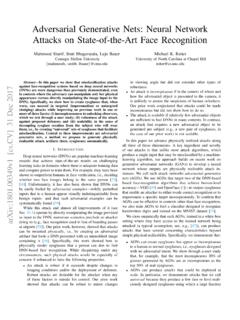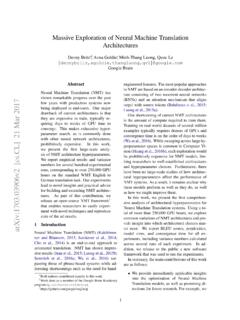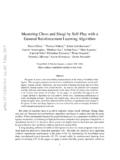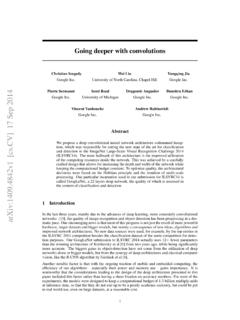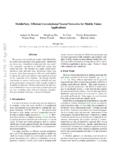Transcription of arXiv:1203.5813v3 [quant-ph] 10 Nov 2012
1 November 13, 2012 1:19 WSPC - Proceedings Trim Size: x solvay-preskill-2011-arXiv-v31 QUANTUM COMPUTING ANDTHE ENTANGLEMENT FRONTIERJOHN PRESKILLI nstitute for Quantum Information and MatterCalifornia Institute of TechnologyPasadena, CA 91125, USAQ uantum information science explores the frontier of highly complex quantum states,the entanglement frontier. This study is motivated by the observation (widely believedbut unproven) that classical systems cannot simulate highly entangled quantum systemsefficiently, and we hope to hasten the day when well controlled quantum systems canperform tasks surpassing what can be done in the classical world. One way to achievesuch quantum supremacy would be to run an algorithm on a quantum computer whichsolves a problem with a super-polynomial speedup relative to classical computers, butthere may be other ways that can be achieved sooner, such as simulating exotic quantumstates of strongly correlated matter.
2 To operate a large scale quantum computer reliablywe will need to overcome the debilitating effects of decoherence, which might be doneusing standard quantum hardware protected by quantum error-correcting codes, or byexploiting the nonabelian quantum statistics of anyons realized in solid state systems,or by combining both methods. Only by challenging the entanglement frontier will welearn whether Nature provides extravagant resources far beyond what the classical worldwould talk at the 25th Solvay Conference on Physics The Theory of the Quantum World Brussels, 19-22 October 20111. Introduction: toward quantum supremacyMy assignment is to report on the current status ofquantum information science,but I will not attempt to give a comprehensive survey of this rapidly growing particular, I will not discuss recent experimental advances, which will be coveredby other convey the spirit driving the subject, I will focus on one Big Question:Can we control complex quantum systems and if we can, so what?
3 Quantum information science explores, not the frontier of short distances as inparticle physics, or of long distances as in cosmology, but rather the frontier ofhighly complex quantum states, theentanglement frontier. I will address whetherwe can probe deeply into this frontier and what we might find or accomplish bydoing so. This Big Question does not encompass everything of interest in [quant-ph] 10 Nov 2012 November 13, 2012 1:19 WSPC - Proceedings Trim Size: x solvay-preskill-2011-arXiv-v32informatio n science, but it gets to the heart of what makes the field quantum informationists are rebelling against a fundamental dualism welearned in school:The macroscopic world is microscopic world is fervently wish for controlled quantum systems that are large yet exhibit pro-foundly quantum behavior. The reason we find this quest irresistible can be statedsuccinctly:Classical systems cannot in general simulate quantum systems cannot yet prove this claim, either mathematically or experimentally, but wehave reason to believe it is true; arguably, it is one of the most interesting distinc-tions ever made between quantum and classical.
4 It means that well controlled largequantum systems may surpass understanding, behaving in ways we find surprisingand therefore hope to hasten the onset of the era ofquantum supremacy, when wewill be able to perform tasks with controlled quantum systems going beyond whatcan be achieved with ordinary digital computers. To realize that dream, we mustovercome the formidable enemy ofdecoherence, which makes typical large quantumsystems behave classically. So another question looms over the subject:Is controlling large-scale quantum systems merelyreally, really hard, oris itridiculously hard?In the former case we might succeed in building large-scale quantum computersafter a few decades of very hard work. In the latter case we might not succeed forcenturies, if question is partly about engineering but it is about physics as well (andindeed the boundary between the two is not clearly defined).
5 If quantum supremacyturns out to be unattainable, it may be due to physical laws yet to be any case, the quest for large-scale quantum computing will push physics into anew regime never explored before. Who knows what we ll find?2. Quantum entanglement and the vastness of Hilbert spaceAt the core of quantum information science is entanglement, the characteristic cor-relations among the parts of a quantum system, which have no classical analog. Wemay imagine a quantum system with many parts, like a 100 page quantum the book were classical, we could read 10 of the pages and learn about 10% ofthe content of the book. But for a typical 100-page quantum book, if we read 10pages we learn almost nothing about the content of the book; the information isnot printed on the individual pages rather nearly all the information in the bookis encoded in the correlations among the pages.
6 (See Fig. 1.) These correlations areNovember 13, 2012 1:19 WSPC - Proceedings Trim Size: x solvay-preskill-2011-arXiv-v33very complex, so that recording a complete classical description of the quantumstate would require a classical book of astronomical Nature really indulge in such extravagant resources, and how can we verifyit?This PageBlankThis PageBlankThis PageBlankThis PageBlankThis a typical quantum state with many parts, a measurement acting on just one partcollects a negligible amount of information about the issue is subtle. Yes, the Hilbert space of a large quantum system is vast,because the classical description of a typical pure quantum state is enormously we don t really care about typical quantum states, because preparing them iscompletely only quantum states that are physically relevant arethose that can be prepared with reasonable (quantum) resources, which are confinedto an exponentially small portion of the full Hilbert space (Fig.)
7 2a). Only thesecan arise in Nature, and only these will ever be within the reach of the quantumengineers as technology , we may model the feasible quantum states this way: Imaginewe havenqubits (two-level quantum systems) which are initially in an uncorrelatedproduct state. Then we perform a quantum circuit, a sequence of unitary operations( quantum gates ) acting on pairs of qubits, where the total number of quantumgates is reasonable, let us say growing no faster than polynomially withn. Equiv-alently, we may say that a state is feasible if it can be constructed, starting with aproduct state, by evolving with a local Hamiltonian for a reasonable time. Likewise,we say a measurement is feasible if it can be constructed as a quantum circuit ofsize polynomial inn, followed by single-qubit quantumly feasible states and measurements are plausibly allowed byNature.
8 Though far from typical, they may nevertheless be hard to simulateclassically. That is why quantum computing is exciting and potentially Separating classical from quantumThe best evidence for such a separation between quantum and classical complexitycomes from quantum algorithms that perform tasks going beyond what we knowhow to do with classical digital computers (Fig. 2b). The most famous examples areShor s algorithms for finding the prime factors of integers and evaluating discretelogarithms,2which are based on using a fast quantum Fourier transform to probethe period of a 13, 2012 1:19 WSPC - Proceedings Trim Size: x solvay-preskill-2011-arXiv-v34 Hilbert Spacewhat wecare about(a)ClassicallyEasyQuantumly HardQuantumlyEasy(b)Fig. 2. (a) Hilbert space is vast, but the quantum states that can be prepared with reasonableresources occupy only a small part of it.
9 (b) We believe that quantum computers can solve someproblems that are hard for classical computers, but even quantum computers have are other such superpolynomial speedups known, in which the timerequired to solve a problem scales polynomially with the input size when a quan-tum computer is used, but faster than polynomially when a classical computer isused. For example, by efficiently simulating topological quantum field theory usinga quantum computer, we can evaluate approximately certain topological invariantsof links and 3-manifolds ( , the Jones polynomial3,4or Turaev-Viro invariant5).In fact, approximate evaluation of such topological invariants is aBQP-hardprob-lem, meaning that any problem that a quantum computer can solve efficiently canbe reduced to an instance of the problem of additively approximating the Jonespolynomial of a superpolynomial speedup is also achieved by a quantum algorithm for com-puting properties of solutions to systems of linear example, ifAisanN NHermitian matrix, andxsolvesAx=bwherexandbareN-componentve ctors, then a quantum algorithm can estimatex Mxin a time scaling like a powerof logN, provided|b is an efficiently preparable quantum state,Ais sparse, andMis an efficiently measurable operator.
10 This problem, too, is , we hope to probe quantum physics in a previously unexplored regimeby running fast quantum algorithms on quantum computers. For this purpose, it isconvenient that the problems with superpolynomial speedups include some problems(like factoring) in the class NP, where the solution can be checked efficiently with aclassical computer. Running the factoring algorithm, and checking it classically, wewill be able to test whether Nature admits quantum processes going beyond whatcan be classically simulated. (However, this test is not airtight, because we have noproof that factoring is really classically hard.)While quantum algorithms achieving superpolynomial speedups relative to clas-sical algorithms are relatively rare, those achieving less spectacular polynomialspeedups are more common. For example, a quantum computer can perform ex-haustive search for a solution to a constraint satisfaction problem in a time scalinglike the square root of the classical time,7essentially because in quantum theory aNovember 13, 2012 1:19 WSPC - Proceedings Trim Size: x solvay-preskill-2011-arXiv-v35probabilit y is the square of an amplitude.
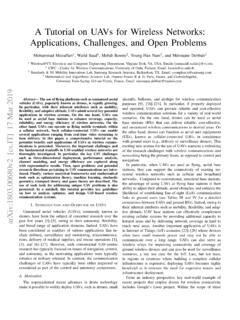
![arXiv:0706.3639v1 [cs.AI] 25 Jun 2007](/cache/preview/4/1/3/9/3/1/4/b/thumb-4139314b93ef86b7b4c2d05ebcc88e46.jpg)
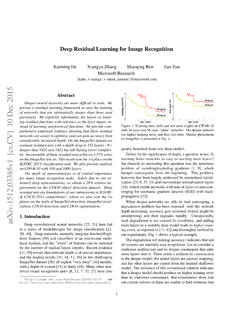
![arXiv:1301.3781v3 [cs.CL] 7 Sep 2013](/cache/preview/4/d/5/0/4/3/4/0/thumb-4d504340120163c0bdf3f4678d8d217f.jpg)
![@google.com arXiv:1609.03499v2 [cs.SD] 19 Sep 2016](/cache/preview/c/3/4/9/4/6/9/b/thumb-c349469b499107d21e221f2ac908f8b2.jpg)
